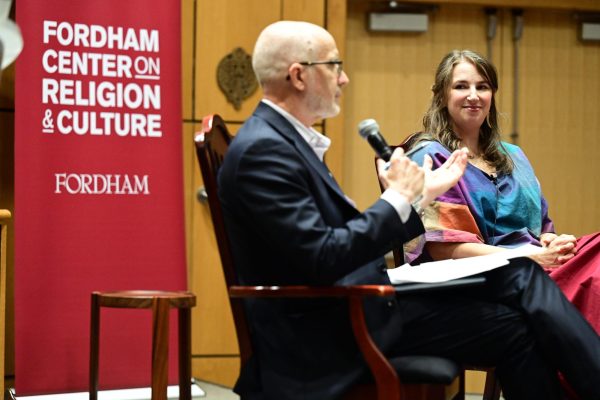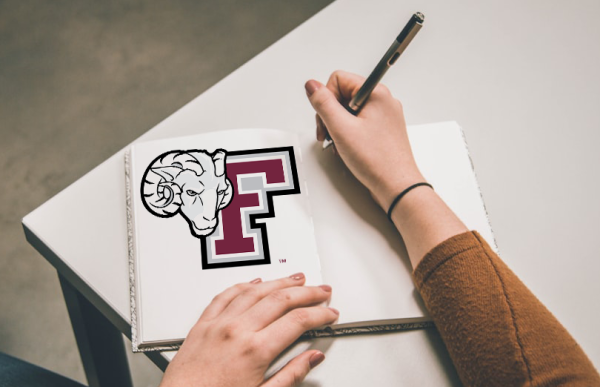Junior Studies the Root of the Word “Camp” and its Importance
Payton Hunt, FCRH ’24, is working on a research project investigating the concept of “camp” in fashion. She is looking into how this idea has been taken over by heteronormative, mainstream media, even though the concept has roots in Black, queer communities. Specifically, Hunt wanted to examine the impact of the 2019 Met Gala, one of the fashion world’s most important events, on the idea of camp and how it was perceived by the public.
Camp can be a difficult concept to pin down the exact meaning of, but through her research, Hunt has come to define camp primarily as a form of personal expression.
“As used by the queer and the Black community, it’s mostly a way to escape boundaries and boxes that the members of these communities were forced into,” said Hunt.
According to Hunt, engaging in camp is a way of rejecting the cultural and social norms that one is forced into through clothing, fashion and behavior. There is a distinct performance element that is key to understanding the nature of camp. To Hunt, the idea of camp as an action and also within the fashion world is best exemplified through the drag balls that took place around the 1980s and and 1990s in New York City. These balls functioned as a safe space for Black and queer individuals to express themselves through their performance.
With this background of the idea of camp in mind, Hunt examined the 2019 Met Gala, which had the theme of “camp” and was led by celebrities like Harry Styles and Karlie Kloss. While Hunt says that this event can be considered camp in essence because everyone participating is intentionally dressing up to put on a show of their fashion and personal style, she notes that this is the heteronormative version of camp.
This version of camp takes away from its original roots and intentions because the Met Gala failed to acknowledge where camp originated and who it was intended for, said Hunt.
In her research essay, Hunt discusses an essay written by American writer Susan Sontag, entitled “Notes on Camp” that served as inspiration for the theme for the 2019 Met Gala. Hunt notes that throughout the entire essay, there is not one mention of the Black community, and only a few mentions of specifically gay men. In doing this, the essay fails to recognize the influence of the Black community and other members of the queer community, like transgender people and queer women, on the concept of camp.
“What I want to show … is why camp fashion is so important to these marginalized communities and how this type of gentrification is perpetuated,” said Hunt.
Hunt notes that Sontag’s essay is often used as a benchmark for determining what camp is, and this essentially ignores camp’s origins as a retaliation against oppression that these marginalized communities have faced.
Hunt was inspired to research this topic more in depth after Styles’ well-known Vogue cover was published in which he was wearing a dress. While Hunt acknowledged that this was a landmark moment as he was the first man to be featured solo on a Vogue cover and he was wearing a dress, she noted that many other famous people, music artists in particular, have been doing this exact same thing for years but have not received the amount of attention that Styles garnered.
Artists like Prince, Michael Jackson and David Bowie broke gender norms within their fashion choices, but Hunt said that this has not been talked about as much because they are all either members of the Black community, the queer community or both.
This bothered Hunt and sparked her desire to discuss the groundbreaking nature of camp in these marginalized communities.
Throughout the research process, Hunt was advised by Jennifer Moorman, Ph.D., of Fordham’s Communications Department.
The first two months of her research, Hunt spent the majority of her time reading books, trying to learn as much information as possible about the idea of camp and the different aspects of it within the world of fashion. She also spent a lot of time analyzing the Met Gala specifically, trying to form judgements about the outfits because the idea of camp is fluid and is constantly changing for Hunt. Now, she is working on her research paper, which she hopes to eventually publish in the Fordham Undergraduate Research Journal.
Overall in her research, Hunt’s goal was to educate herself more about this issue and to also give clarity to what camp is and remind people of the importance of marginalized communities in culture today.
“Marginalized communities are often the ones who create these kinds of social movements, these kinds of things that you want to be a part of, and credit should be given where credit is due, and I think this is a great example of where credit isn’t given where it should be due,” said Hunt.















































































































































































































